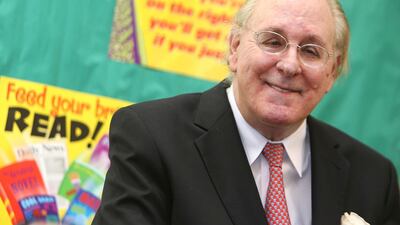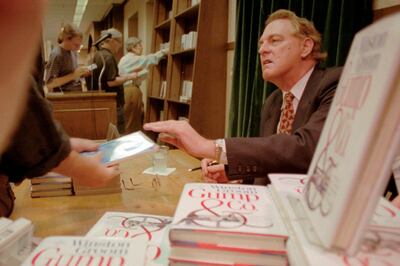Winston Groom, the writer whose novel Forrest Gump was made into a six-Oscar winning 1994 movie that became a soaring pop cultural phenomenon, has died at the age of 77.
Groom died in the south Alabama town of Fairhope, mayor Karin Wilson said in a message on social media. A local funeral home also confirmed the death and said arrangements were pending.
"While he will be remembered for creating Forrest Gump, Winston Groom was a talented journalist and noted author of American history. Our hearts and prayers are extended to his family," Alabama Governor Kay Ivey said in a statement.
Forrest Gump was the improbable tale of a slow-witted but mathematically gifted man who was a participant or witness to key points of 20th Century history — from Alabama segregationist Governor George Wallace's "stand at the schoolhouse door," to meetings with presidents.
It was the best known book by Groom, who grew up in Mobile, Alabama, and graduated from the University of Alabama in 1965, according to a biography posted by the university.
Groom served in the Army's Fourth Infantry Division from 1965 to 1969, the university said. His service included a tour in Vietnam — one of the settings for Forrest Gump.
He wrote 16 books, fiction and nonfiction. One, Conversations with the Enemy, about an American prisoner of war in Vietnam accused of collaboration, was a Pulitzer Prize finalist.
It was Forrest Gump — and the success of the 1994 movie starring Tom Hanks in the iconic role of Gump, as well as Sally Field and Gary Sinise — that earned him widespread fame.
The novel is considerably different from the film. Don Noble, University of Alabama professor emeritus of English, and longtime friend of Groom's told the Tuscaloosa News that the novel was "darker" and "richer" than the movie.
"You can make a lot of money as a comic writer, but you can't get no respect," Noble said. "But Forrest Gump is really actually quite a fine novel. It's more subtle and more complicated ... richer than the movie."
The movie, which also starred Robin Wright and Mykelti Williamson, became deeply embedded in the American psyche and has remained an enduring television staple and huge cultural phenomenon since.
"It touched a nerve," Groom told the Tuscaloosa News in 2014.
The film dominated the 1995 Academy Awards, winning six Oscars including best picture, best director for Robert Zemeckis and best actor for Hanks.
It was 1994's second-highest grossing film at the box office, after The Lion King.
The basic outlines of Gump’s life are the same as they are in the book: Gump plays football under Paul “Bear” Bryant at the University of Alabama, serves in Vietnam and starts a major shrimp business.
But the film made major departures. Gump was not a math savant as he was in the book, and was a more saintly soul. The film took away Gump’s size - Groom said he envisioned John Goodman playing him.
They "took some of the rough edges off," Groom told the New York Times in 1994.
Groom also wrote non-fiction on diverse subjects including the Civil War, World War I and Alabama's Crimson Tide football.
In 2005, Groom released 1942: The Year That Tried Men's Souls, which chronicled the first year of US involvement in World War II.
In 2009 he released Vicksburg 1863, an account of the Union siege that brought a novelist's touch to historical figures like Ulysses S. Grant, William T. Sherman and Jefferson Davis, president of the confederacy.
His most recent novel, El Paso, was published in 2016.
Groom got $350,000 (Dh1.3 million) for the rights to Forrest Gump plus three per cent of the net profit of the movie. But he got into a serious dispute with Paramount Pictures when they told him a film that had earned more than $600 million was in the red after expenses.
But years later he wasn’t bitter.
"They did an excellent job," he told the Tuscaloosa News. "I would have probably preferred my version of it, but that thing never would have opened."
The book became a major best-seller in the wake of the film, and Groom got a much better deal for the follow-up novel, 1995's Gump and Co.


